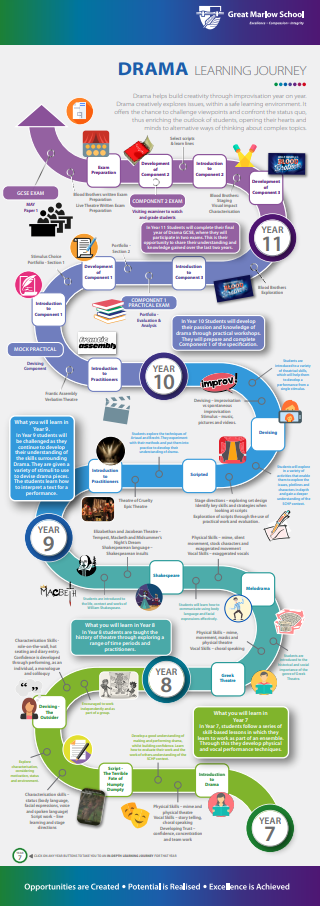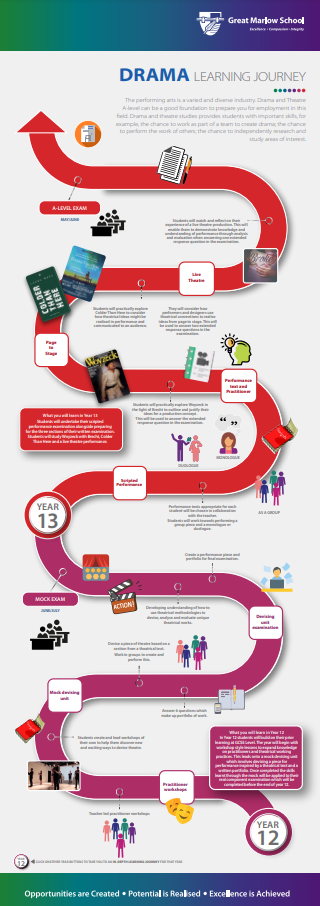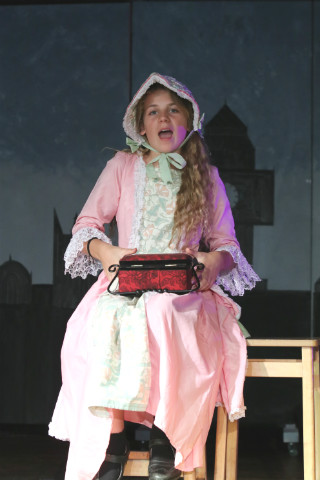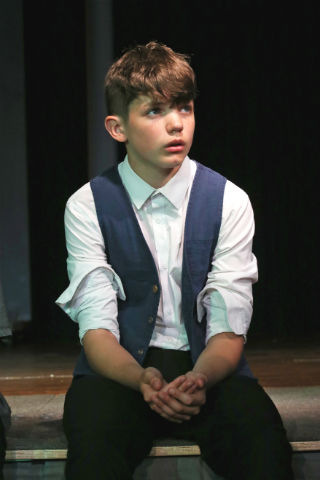
Telephone - 01628 483 752
Company Registration No.07690054
- Welcome
- News & Events
- About Us
- School Life
- Canteen & Catering
- Careers Programme
- Duke of Edinburgh’s Awards
- House System
- Library
- Lockers & Bicycle Racks
- One to One Laptop Scheme
- Parents’ Evenings
- Prefects: Sixth Form & Year 11
- Safeguarding
- School Nurse
- School Transport
- Student Support and SEN
- Teacher Training
- Transition to Year 7
- Uniform, Hair, Jewellery, Phones
- 6th Form
- Curriculum
- Parent & Carers
- Attendance Guide
- Bucks Family Information Service
- Bucks School Transport
- Communication & Catering
- Friends of Great Marlow School
- Information Evenings
- Gift Aid
- Letters Home
- Mental Health Support
- Online Safety Resources
- Parent/Carer Services
- Progress Review Guides
- School Uniform Shops
- Special Educational Needs
- The Voice – School Newsletter
- Student Area
- Sport
- Gallery
Drama
 ABOUT DRAMA
ABOUT DRAMA
Films, plays, musicals, pantomimes, puppet theatre, television dramas including soap operas and radio all expose people to the excitement and emotional involvement that makes drama so important in our lives today.
Drama models aspects of our lives. The world in which we live is explored through dramatic presentation and language Central to drama is an exploration of the human circumstance, it examines issues affecting people in particular circumstances.
Drama was introduced into a few select schools between the two world wars but expanded in the 1950s, when it was recommended that creative work should be at the heart of the curriculum.
“Drama helps students to think creatively, interact effectively, express themselves persuasively and to believe in themselves” David Pickard General Director Glyndebourne
The importance of drama as a subject is recognised today as it thrives in schools across the country.
- Drama at Great Marlow School
- Learning Ladders
- Wider Curriculum
- Key Stage 3 Drama
- Key Stage 4 Drama
- EDEXCEL AS & A2 Drama & Theatre Studies
- Career Choices in Drama
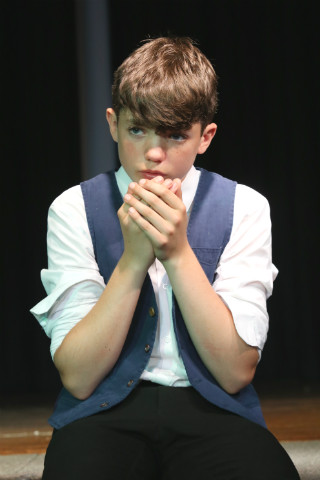
DRAMA AT GREAT MARLOW SCHOOL
Drama at Great Marlow is a lively, inclusive subject.
It is taught throughout the school at Key Stage 3; is a popular GCSE option and a successful A-level course.
GMS has two drama studio spaces and the staff are highly committed subject specialists.
There are usually two drama productions every year: at Christmas and at the end of the summer term. It is important to GMS that the immense talent that its students have is showcased in a varied and imaginative way.
WIDER CURRICULUM
The Wider Curriculum allows students to take a further interest in their subjects and subject related material they study at school. The Wider Curriculum also enables parents and carers to actively engage with the opportunities offered by each department. Each PDF is hyperlinked, so when you click on them, the links will take you to areas where you may read, view, listen, visit and be creative.
| DRAMA WIDER CURRICULUM KS3 | DRAMA WIDER CURRICULUM KS4 | DRAMA WIDER CURRICULUM KS5 | ||
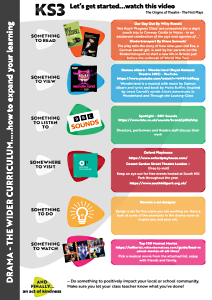 |
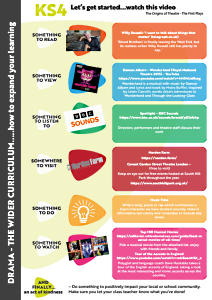 |
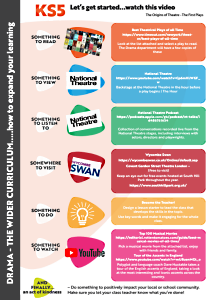 |
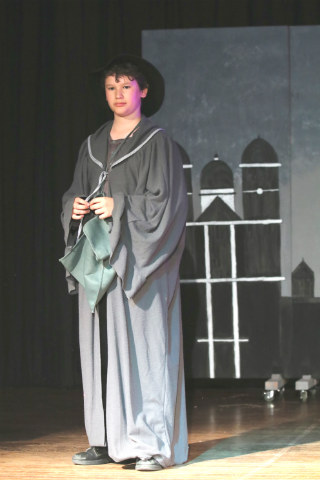 KEY STAGE 3 DRAMA
KEY STAGE 3 DRAMA
Year 7
In Year 7, students follow a series of skill based lessons in which they learn to work as part of an ensemble, through this they develop physical and vocal performance techniques.
Year 7: Term 1
Introduction to Drama
Students are introduced to key skills and strategies within drama. The students will develop a good understanding of making and performing drama, whilst building confidence. They will learn how to evaluate their work and the work of others.
Skills Developed
- Physical Skills – including mine and physical theatre
- Vocal Skills – story telling, choral speaking
- Developing Trust – confidence, concentration and team work
Year 7: Term 2
Script Work
Students will explore the text ‘The Terrible Fate of Humpty Dumpty’. The module focuses on page to stage. Students will explore characterisation, considering motivation, status and environment. In addition, they will have the opportunity to perform and learn monologues.
Skills Developed
- Characterisation Skills – status (body language, facial expressions, voice and spoken language)
- Script Work – line learning and stage directions
Year 7: Term 3
Devising – The Outsider
Students explore the concept of isolation and social exclusion, while learning about a range of dramatic techniques. They are encouraged to work independently and as part of a group throughout this unit, in doing so they continue to develop in confidence.
Skills Developed
- Characterisation -this involves developing characters using strategies like Role-on-the-Wall, hot seating and diary entry.
- Confidence – is developed through performing a monologue and soliloquy individually.
Year 8
In Year 8 students are taught the history of theatre through exploring a range of time periods and practitioners.
Year 8: Term 1
First Theatre and Pantomime
Students are introduced to the historical and social importance of the genre of Greek Theatre. They will use appropriate theatre terminology to understand how Greek and Medieval theatre has a place in 21st century theatre. Towards the end of term 1 a study of pantomime is made, with a focus on its origins.
Skills Developed
- Greek Theatre – choral work and Greek stories
- Pantomime – Where it began, characterisation, comic timing and other techniques.
Year 8: Term 2
Melodrama, Mime, Travel Project
Students will learn how to communicate using body language and facial expressions effectively: non-verbal communication is an important way to support the spoken word, and as a replacement for the spoken word. Students will also be expected to evaluate their work verbally to show their understanding of the information provided in the unit.
Skills Developed
- Melodrama – stock characters.
- Mime – the history of mime, physical theatre.
- Travel Project – students work on a project in groups to build their own story techniques learnt thus far in drama lessons.
Year 8: Term 3
Introduction to Shakespeare
Students are introduced to the life, context and works of William Shakespeare.
Skills Developed
- Elizabethan and Jacobean Theatre – Tempest, Macbeth and Midsummer’s Night’s Dream
- Shakespearean language – Shakespearean insults
Year 9
In Year 9 students are introduced to GCSE Drama. They are given a variety of stimuli to use to devise drama pieces. The students learn how to interpret a text for performance.
Year 9: Term 1
Script Work
Students develop an understanding of racism and conflict using the script Noughts and Crosses. A variety of activities enable students to explore the issues in the text, alongside characterisation and plot-line to gain a deeper understanding of the play and its message.
Skills Developed
- Characterisation – status
- How to challenge stereotypes – using drama to educate (TIE)
Year 9: Term 2
Putting on a Show
Students will develop an understanding of the various roles found in theatre and the skills required to put on a show.
Skills Developed
- Careers in theatre
Characterisation – status
Year 9: Term 3
Silent Movies.
Students explore the genre of silent movies. The history of them and how they have influenced modern theatre and drama productions. Students create their own film, drawing on knowledge and sklills honed in KS3.
Skills Developed
- Acting without using voice.
- Important use of music to build atmosphere.
- Exaggerated movement
- Physical theatre.
KEY STAGE 4 DRAMA
Year 10 OCR
Autumn 1
Introduction to drama practitioners
Autumn 2
- Mock Component 1
- Research Log
- Research/ Creating and Developing
- Mock Portfolio
Spring 1 & 2
- Real Component 1
- Research Log
- Research/ Creating and Developing
Summer 1 & Summer 2
- Real Component 1
- Research Log
- Research/ Creating and Developing
- Blood Brothers (students have to purchase a copy of the play)
Year 11 Students from 2018
Year 11 OCR
GCSE Drama 2022
Ofqual have confirmed that students taking Drama in the summer of 2022 will have a reduction in non-exam assessment (NEA) requirements.
- There will be a reduction in the minimum duration of performances for Devising Drama and Presenting and Performing Texts.
- Monologues will be allowed to be presented for performance where performances are not possible in both NEA components. As per the specification requirements, designers must work with performers.
- There will be no visiting examiner for Presenting and Performing Texts, instead performance recordings will be submitted.
- There is a reduction in the number of extracts that performers/designers need to showcase in Presenting and Performing Texts.
- The assessment window for the recording of the Presenting and Performing Texts is extended, to provide more flexibility for centres.
- There is a relaxation in the requirement to see live theatre. the evaluation of live, will, as currently, be allowed on a recorded/streamed/digital performance.
Autumn 1
- Blood Brothers
- Focus:
- Staging
- Visual impact
- Characterisation
Autumn 2 & Spring 1
- Component 2 – (Component Code: 9DR0/02)
- “Blood Brothers”
- Concept Pro-forma
- Blood Brothers
Assessment for Component 2
Non-examination assessment for component 2 is 20% of the qualification, worth 60 marks
Spring 2 & Summer 1
Drama: performance and response
- Exam
- Section A: “Blood Brothers”
- Section B: Live Theatre Evaluation
EDEXCEL AS AND A2 DRAMA & THEATRE STUDIES
Edexcel’s Drama and Theatre Studies specification is designed to provide a balance across a range of learning activities.
Students who complete the course successfully will have a thorough understanding of drama and theatre, highly toned analytical and creative skills and an ability to communicate effectively with others.
As well as studying a wide range of texts and practitioners, they have to perform monologues, duologues, a devised piece of theatre and a script extract.
Drama and Theatre Studies
Autumn 1
Introduction to Practitioners.
Autumn 2
Mock Component 1: Devising and Portfolio
Spring 1, Spring 2 and Summer 1
Component 1: Devising and Portfolio
Non-examination assessment makes up 40% of the qualification: 80 marks. Component Code: 9DR0/01
Content overview – students:
- devise an original performance piece
- use one key extract from a performance text and a theatre practitioner as stimuli
- work on a choice of text and practitioner chosen by GMS Drama Department.
- perform
The work is internally assessed and externally moderated.
There are two parts to the assessment:
1) The portfolio (40 marks)
There are two parts to the portfolio, worth a total of 60 marks. (40 marks for AO1, creating and devising; 20 marks for AO4, evaluating)
Recommendations for the portfolio are as follows:
- a written assignment of 2500–3000 words
- or a recorded version of the evidence of between 12–14 minutes
- or a combination of handwritten/typed evidence of between 1250–1500 words and recorded/verbal evidence of approximately 6–7 minutes.
2) The devised performance (20 marks)
Summer 2
- Introduction to the scripts Woyzeck and Colder Than Here
A2 Units
The Examination Board has advised that the A2 course can be adapted following Coronavirus.
GMS has implemented these adaptations.
The A2 qualification consists of three components, component 1 and 2 are non-examination assessments- component 3 is the written examination.
Component 1: Devising, has 80 marks, weighted at 40%. The Drama Department is offering a monologue and duologue option for 2022.
The minimum performance timings have changed: monologue 1.5 minutes, duologue 3 minutes, group performance 3 minutes.
Component 2: Text in Performance, will be 24 marks (mono or duo) or 36 marks (group) and is weighted at 20%. Students must complete one key extract from a performance text.
The minimum performance times have changed: monologue 1.5 minutes, duologue 3 minutes, and group performance 3 minutes.
For the non-examination assessment components, the Drama Department have made alternative provision for design students who cannot realise their design in performance.
Component 3. The Section A – Live Theatre Evaluation is to be done on a live steam digital or recorded performance and have made changes to the Live Theatre Statement that centres complete in line with these changes.
Autumn 1 Text – Exploration
Students study a text in its original performance context and compare it with a modern live production. Students explore two set texts from a directorial perspective, they are:
- Woyzeck
- Colder Than Here
This unit is worth 40% of the overall mark.
There are three areas studied:
- A live theatre evaluation.
- Page to stage: realisation of a complete performance text.
- Interpreting one complete performance text, in light of one practitioner, for a contemporary audience.
Examination is 2 hours and 30 minutes duration
Autumn 2 & Spring 1 – preparation for practical examination
Monologues and group performance prepared for a visiting examiner.
This non-examination assessment is worth 20% of the qualification = 60 marks
There are three areas of study:
- A group performance/design realisation of one key extract from a performance text.
- A monologue or duologue performance/design realisation from one key extract from a different performance text.
- Choice by centre of a performance text.
Spring 2 and Summer 1 – preparation for written examination
The written examination will assess knowledge and understanding of :
- Woyzeck
- Colder Than Here
- Live Theatre
DRAMA & THEATRE STUDIES BEYOND SCHOOL
A-level Drama and Theatre Studies is recognised as a specialist qualification for all drama and theatre degree courses.
For those wishing to apply for other degree courses, apprenticeships or work the qualification is well regarded because it trains students to be analytical, evaluative and risk takers.
The qualification is valuable for students wishing to pursue a career that involves people orientated skills.
In the past, students have gained entry into well-established theatre academies, universities as well as a range of subject related careers.
Career Options in Drama
| Actor / Actress | Drama Teacher | Social Worker |
| Arts Administrator | Drama Therapist | Stage Manager |
| Charities Administrator | Journalist | Television Production |
| Community Worker | Radio Presenter | Youth Worker |
| Creative and Media | Set Designer |
